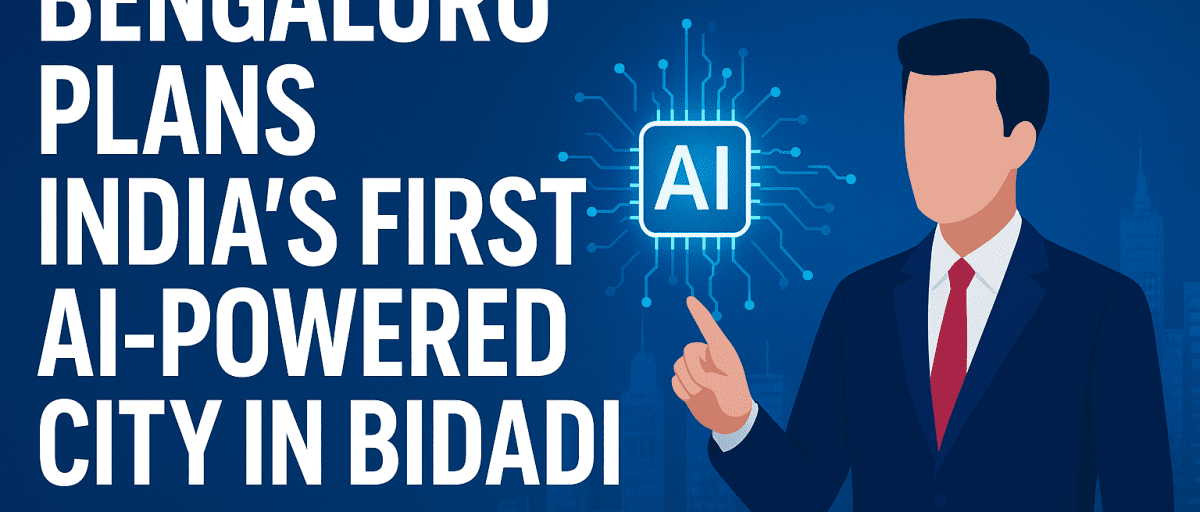Bengaluru has never been shy about wearing the “India’s Silicon Valley” tag. And now, the city is trying to stretch that identity a little further. Karnataka’s Deputy Chief Minister D.K. Shivakumar has announced plans to build India’s first AI-powered city in Bidadi, just a short drive from Bengaluru.
On paper, it sounds futuristic—almost like something out of a tech expo pitch. But if pulled off, this project could really change how Indian cities are built and managed.
Table of Contents
The Big Reveal
Shivakumar made the announcement earlier this week during an industry event, and he didn’t mince words. “This city at Bidadi will not just be about buildings and roads. It will be a model for how technology can shape governance, mobility, sustainability, and everyday life,” he said.
It’s not the first time we’ve heard ambitious talk about tech-enabled cities in India. But what makes this one different is the AI-first angle. Instead of just laying fibre cables and putting up CCTV cameras, the idea here is to let artificial intelligence sit at the heart of city planning and services.
Why Bidadi of All Places?
If you’re wondering, “Why not Electronic City or Whitefield?”, the choice of Bidadi actually makes sense.
- It’s close enough to Bengaluru’s tech ecosystem to draw talent and companies.
- But it’s also far enough (about 32 km away) to escape the chaos, traffic jams, and land crunch of the city.
- Plus, Bidadi already has a strong industrial presence, especially in automotive manufacturing, which makes it easier to plug into the EV and AI-linked industries.
For the government, it’s also a way to ease the burden on Bengaluru while kickstarting development in the outskirts.
What Does “AI-Powered” Actually Mean?
Buzzwords aside, what exactly will this city look like? The initial vision is to weave AI into pretty much everything:
- Governance: AI platforms for waste management, water supply, power use, and even citizen complaint systems.
- Transport: Smarter traffic lights, predictive public transport schedules, and maybe even support for autonomous vehicles in the future.
- Sustainability: Sensors to track air and water quality in real-time, AI models to balance renewable energy, and better energy grids.
- Safety: Yes, there’ll be AI surveillance, though officials insist it’ll come with “privacy safeguards.” We’ll have to see how that plays out.
- Healthcare & Education: AI-powered telemedicine centers and smart classrooms for personalised learning.
The whole idea is that AI won’t just be an add-on—it’ll be baked into the DNA of the city.
Industry Buzz
Naturally, the announcement has got Bengaluru’s tech circles buzzing. A founder of an AI startup I spoke with (off the record) put it nicely: “It sounds like a sandbox for everything we’ve been building in Bengaluru. The challenge is execution. We’ve seen too many big announcements lose steam after the headlines fade.”
That scepticism isn’t unwarranted. India’s “smart city” projects haven’t always lived up to their hype. But if there’s any state that can make an AI city work, it’s probably Karnataka, given the depth of talent and corporate interest in Bengaluru.
Drawing Parallels With Global Experiments
India isn’t the first to attempt this. South Korea has Songdo, the UAE has Masdar City, and Saudi Arabia is building Neom. The difference is, those projects often had billions of dollars in oil money behind them. India will have to build smarter—with tighter budgets, a bigger focus on inclusivity, and policies that attract both private and foreign investment.
Still, if Bidadi becomes even half as functional as Songdo, it could put Karnataka on the global map for AI innovation in urban planning.
The Economic Angle
Beyond the tech glamour, this project has clear economic goals:
- Attract Investments: An AI-first city is bound to attract multinational firms, investors, and AI startups looking for a live testing ground.
- Create Jobs: Not just in coding and AI, but in construction, maintenance, urban planning, green tech, and services.
- Boost Karnataka’s AI Credentials: Bengaluru is already India’s AI capital, but this could cement that status globally.
Deputy CM Shivakumar also hinted that a detailed blueprint will be shared soon, covering land use, financing, and timelines.
But Let’s Be Real: The Challenges Are Huge
It’s easy to get carried away by the promise of a high-tech city, but challenges are staring right back:
- Land Acquisition: Bidadi has space, but getting large tracts cleared for a new city isn’t easy.
- Funding: Building a city from scratch requires serious money. Who pays for what, and how fast, is the big question.
- Public Trust: AI brings its own baggage—privacy concerns, fears of job loss, and scepticism about over-surveillance.
- Talent Migration: Convincing professionals to move to Bidadi instead of staying in Bengaluru’s buzzing neighborhoods will take more than fancy infrastructure.
A Balanced Take
As someone who has tracked Bengaluru’s growth for years, I see this announcement as both exciting and a little risky. Exciting because it’s exactly the kind of bold thinking Bengaluru is known for. Risky because execution in India’s infrastructure space is notoriously tough.
If this turns into another half-done “smart city” project, it’ll be a wasted opportunity. But if the state manages to pull together industry, academia, and investors, Bidadi could very well become a template for other Indian states.
Closing Thought
At the end of the day, what Bengaluru is attempting with Bidadi is more than just a real estate project. It’s a statement. A statement that India’s next stage of growth won’t just be about coding for global clients—it will be about creating cities that live and breathe technology.
And if all goes as planned, in a few years, we might see headlines saying: “From traffic-clogged Bengaluru to AI-smart Bidadi—India’s new tech capital has arrived.”

Rupak Chakrabarty is the Editor at NextWhatBusiness and a business strategy analyst with over two decades of hands-on experience advising small and mid-sized businesses. His work focuses on entrepreneurship, franchise models, business planning, and market behaviour, with an emphasis on practical decision-making over theory. When not writing or consulting, he enjoys adventure sports, speed, and exploring stories behind businesses.



